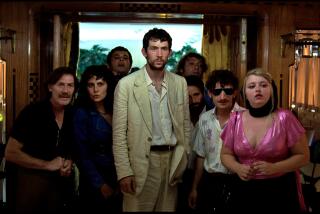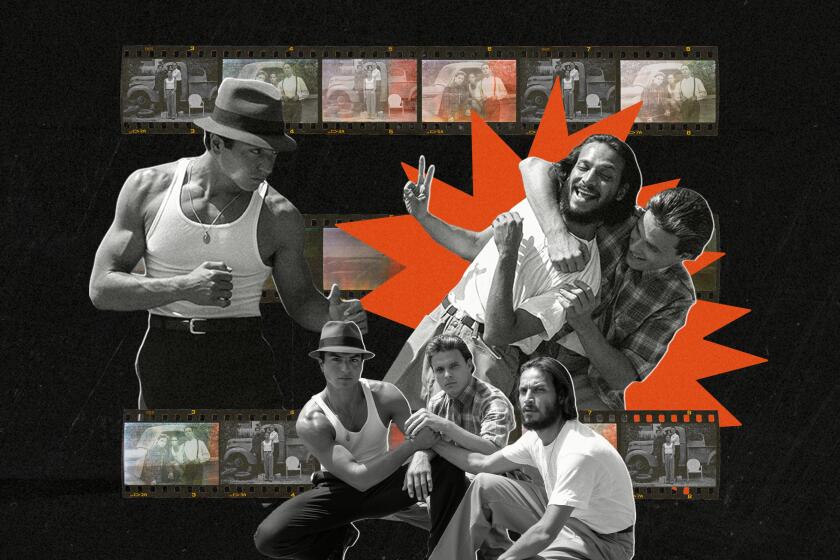Review: The sharp heist-thriller pleasures of ‘The Whistlers’ translate into any language
In a sign that our film culture is either advancing or declining, the recent Academy Awards triumph of the South Korean film “Parasite” initiated more than a few online discussions on the pros and cons of subtitles. For those who enjoy watching films shot in countries and languages other than their own, subtitles are a vital gateway through a cultural barrier. For those who prefer a more monocultural cinematic diet, subtitles are a barrier in themselves.
That this argument even exists is, in an English word, depressing. (You may disagree, though if so, I doubt you’re reading this review.) But it becomes fascinating to consider with regard to the great Romanian writer-director Corneliu Porumboiu, whose films have shown a supremely intelligent fascination with the complexities of interpretation and language. His 2006 debut feature, “12:08 East of Bucharest,” was a rueful comedy about the meaning of revolution, as a word and a concept. In his slow-boiling detective drama “Police, Adjective” (2009), words and their definitions became instruments of state oppression.
“The Whistlers,” a sleek, sharply chiseled scherzo of a movie, represents both a continuation of this exploration and a bit of a departure. Shuttling between the Canary Islands and Bucharest with one quick detour to Singapore, it’s Porumboiu’s first movie to mimic the glossy syntax of a Hollywood crime thriller, to take him beyond Romanian borders and to feature dialogue in multiple languages. The most intriguing of these by far is El Silbo, or Silbo Gomero, a little-known “whistling language” that has been used for thousands of years on the island of La Gomera.
And in light of recent debates, let’s give credit where it’s due: “The Whistlers” makes reading subtitles not just vital, but fun. When someone here whistles, your eyes leap to attention at the accompanying words onscreen, not just to comprehend their meaning but to see how they correspond to sounds that bear only the faintest resemblance to human speech.
A demonstration of how to tackle this difficult dialect — itself a high-pitched derivation of Castilian Spanish — is provided early on. You stick your thumb in your mouth and fold it back, as though you are gripping a gun, aimed in such a way that the bullet will come flying out your ear. You then blow, but with great care and precision: An entire alphabet is delineated by the specific pitch, modulation and duration of each whistle.
The person receiving this lesson is a weary Bucharest cop named Cristi, played by the great Vlad Ivanov (“Police, Adjective,” “4 Months, 3 Weeks and 2 Days”) with his usual magnetic, faintly menacing drabness. Cristi has come to La Gomera on a faux holiday, during which he will learn El Silbo from a gang of Romanian mobsters, so that they can all convey information aloud (and it is very loud) outdoors, sometimes across great distances, without any fear of being detected by Cristi’s law-enforcement colleagues.
How Cristi entered into cahoots with these crooks will be revealed in due course, but suffice to say it involves a femme fatale (Catrinel Marlon), a boss (Agustí Villaronga), a heavy (Antonio Buil) and an incarcerated businessman (Sabin Tambrea) who runs a mattress factory cum money-laundering operation.
In classic noir tradition, it’s the femme fatale who registers most strongly, as both a narrative device and a screen presence. Her name is Gilda, and the slinky, dark-haired Marlon does her considerable utmost to warrant the explicit comparison to Rita Hayworth. That’s just one of many Hollywood allusions in “The Whistlers,” a funhouse of cinematic mirrors that at one point references a famous sequence from “Psycho”; in another scene, Cristi and his similarly treacherous superior, Magda (Rodica Lazar), have an assignation at a theater showing “The Searchers.” Porumboiu slyly folds these allusions into the movie’s genre DNA, in set-pieces that temporarily recast the story as slasher picture and western.
But the most pronounced influence may be Steven Soderbergh, whose pictures themselves often evoke the male-dominated, mission-oriented dynamics of Howard Hawks. The heist-thriller mechanics in “The Whistlers” offer an obvious tip of the fedora to “Ocean’s Eleven,” but Porumboiu’s artfully segmented plot gains momentum from explanatory flashbacks that keep snapping in and out of the plot like switchblades, in a way that may remind you of Soderbergh’s “The Limey.” The flashbacks, oddly, leave us both more informed and increasingly unmoored, and also recast Cristi not as a sly hero but as a pathetic chump, the pawn in a scheme that seems more hopelessly elaborate at every turn.
It’s a lot of fun — and often quite funny — while it lasts, though I could have used less gunplay and more whistling, an element that, more than anything else here, speaks to Porumboiu’s gift for deadpan absurdity. Like Soderbergh, the director is a deft, efficient craftsman and a restless experimenter, someone whose work often toggles playfully between smooth, absorbing entertainment and sly intellectual exercise. (Sometimes, it’s both.) His panoply of references feels like more than know-it-all cinephilia run amok; the specific idiom he is trying to master is not just an ancient whistling language, but the language of genre itself.
This isn’t the first time he’s made a large sum of money crucial to the plot; his previous film, “The Treasure” (2015), a droll comedy about a search for buried loot, is one of his best. Nor is it the first time he has both exploited and indicted surveillance technology, in this case the cameras we see trained on every corner of Cristi’s apartment, which occasion a vigorous if faintly gratuitous sex scene. Still, “The Whistlers” — with its jittery time frames, snappy editing rhythms and eclectic musical soundtrack that veers from Iggy Pop to Bellini — can’t help but feel distinct, on an almost molecular level, from Porumboiu’s earlier work.
In the past he has been a master of the patient buildup — the long, fixed takes that blend rigorous realism and bone-dry humor, and which can culminate in a kind of moral and cinematic epiphany. That epiphany never really arrives in “The Whistlers.” The strictures of the swift-moving plot never allow the characters to achieve the rich dimensionality often seen in Porumboiu’s work, and the worlds we see — from the sunny island getaway of La Gomera to the gray streets of Bucharest — feel more touristic than fully inhabited.
And this may be entirely by design. You could see “The Whistlers” as an admission that sometimes even our most singular auteurs just want to kick back and have fun (or perhaps spend a lot of money and make a commercial entertainment). You could also see it as a dilution, though in no way a negation, of its maker’s talent, proving that genre has its pleasures but also its compromises.
Which might, in turn, encourage us to see this twisty tale of an easily manipulated Romanian cop as a kind of meta-indictment, a commentary on the plight of the local artist as jet-setting international sellout. Or not. It’s the rare filmmaker who can speak more than one tongue, and in a way that leaves room for more than one interpretation.
‘The Whistlers’
(Not rated)
(In Romanian, English, El Silbo with English subtitles)
Running time: 1 hour, 37 minutes
Playing: Opens Feb. 28 at Laemmle Playhouse 7, Pasadena; Laemmle Royal, West Los Angeles; Laemmle Town Center 5, Encino; AMC Rolling Hills 20, Torrance
More to Read
Only good movies
Get the Indie Focus newsletter, Mark Olsen's weekly guide to the world of cinema.
You may occasionally receive promotional content from the Los Angeles Times.







